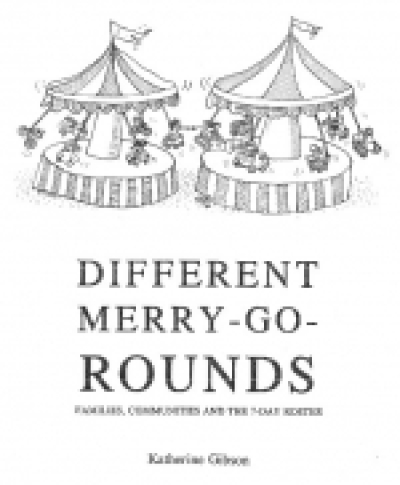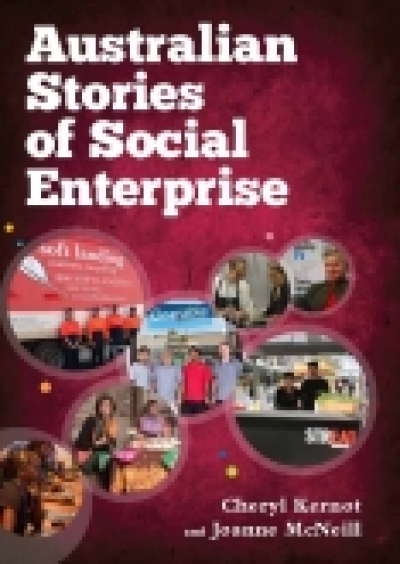Publications
This article engages with the notion of the city as capitalist space, focusing on the specific actors that come together to realign economically heterogeneous spaces into the monolithic, capitalist city.
By drawing from the experience of a community education project, this article demonstrates how community members can understand ourselves to be part of the relational dynamics through which collective change can take place.
"The commons" is often represented in terms that place capitalism at the center of the story, thus making "a commons future" difficult to imagine. This paper examines this problematic through research on the common property management regime of New England fisheries, seeking to offer alternative representations of commons that might open up economic possibility.
This paper challenges the ways in which the First World/Third World binary, coupled with a "capitalocentric" discourse of economic development, limit possibilities for economies of community, cooperation and participation. Fisheries are used as an example to argue that undermining the presence of capitalism in the First World and making space for that which has been excluded (for example, community-based and territorial fisheries) requires a new economic and spatial imaginary.
The discourse of fisheries science and management displaces community and culture from the essential economic dynamic of fisheries. The goal of this dominant discourse is to enclose fisheries, to constitute it as within the singular and hegemonic economy of capitalism. Alternative economies, such as those based on the presence of community, are always seen as either existing before or beyond the dominant economic formation. The category of community is, nevertheless, being incorporated into contemporary fisheries science and management where it has the potential to disrupt the ontological foundations of the current management regime. This paper explores this potential disruption.
In this editorial we review Joseph Stiglitz's Price of Inequality. While we admire his analysis of the problems caused by economic inequality, we question whether or not the argument for progressive, regulated capitalism is the best thing we can hope for and work towards.
This is a short review of Renata Salecl's ‘The Tyranny of Choice.’ Salecl shows us that our actions are not driven entirely by the rational mind but are influenced by unconscious desires that are themselves produced by a relationship to the symbolic order. One implication is that we can't simply will ourselves a new world. Stepping out of the political and ethical morass of fighting over which form of capitalism is better or more humane might require more than rational discussions about the vagaries of capitalism, speaking truth to power, or making rational demands on the state.
A booklet outlining some of the major impacts of the 7-day work roster on families and communities from the perspective of women in four coal-mining communities in Central Queensland, Australia.
Based on action research conducted in 1991, the study raises some of the issues encountered by women, men and families after the introduction of the 7-day roster. It highlights the need to consider factors broader than increased pay arrangements and men's leisure time.
The booklet is illustrated with cartoons by Gaynor Cardew.

This article examines the economy of the Occupy Wall Street movement, and traces its connections to both historic and contemporary factory and farm occupations.
This paper explores the production of space and time at a worker co-operative copy shop in Western Massachusetts.
In a context of climate change, this paper uses J.K. Gibson-Graham's concept of a community economy to develop new economic possibilities outside of the growth model. We argue that cooperatives offer a significant transformative opportunity to resocialise and repoliticise economies away from the economic growth imperative.
The book review explores how a range of authors engage with the political possibilities and limitations of affect theory.
Inspired by and written for the global #Occupy Movement, this text is part theory, part strategy and part call-to-action for the immediate and long-term work of identifying and seizing spaces of democratic practice (occupy!), linking them together in networks of mutual support and recognition (connect!), and drawing on our collective strength to actively create new ways of meeting our needs and making our livings (create!).
In this article, the dynamics through which social processes are being increasingly individualized are called into question, and alternative constructions are offered. When subjectivity and ethics are reconceptualized, new paths for ethical engagement and non-unitary subjects begin to emerge.
There is widespread agreement that current climate change scenarios mean we have to change how we live on this planet. Yet our current understandings of social and behavioural change seem insufficient for the task at hand. In this paper we explore Bruno Latour’s notion of ‘learning to be affected’, and we argue that this idea of bodily learning seems well-suited to thinking about how people can be moved to act in response to the human and nonhuman world that is all around us. We also argue that research can prompt and sharpen this form of embodied learning when it is conducted in a performative and collective mode that is geared towards crafting rather than capturing realities.
Using story and analysis, this paper explores the role of my (maternal) body in producing ethnographic knowledge, re-envisioning ethnographic fieldwork as an embodied relational engagement with a 'site' or 'space' where a multiplicity of trajectories converge.
In response to the concern expressed by some senior Chinese Studies academics over young scholars 'deserting to the disciplines', Kelly suggests that Gen Y are less interested in 'understanding China' and more interested in interdisplinary, culturally engaged (yet cross-cultural and collective) thinking for a new and better world - of which China is an important part.
With the example of a practice scenario, readers can see the practical possibilities that open up with the shift in perspective invited by situational analysis.
By pragmatically drawing connections across theoretical differences, it is hoped that researchers will engage critically with their own theoretical commitments and assumptions, thus opening themselves up to new possibilities and to new creative ways of coming together.
This book is a critical history of development practice and professionalism in nothern Thailand, exploring how a postdevelopment perspective informed by the work of J.K. Gibson-Graham can shed new light on the nature of development practice and hope for the future.
![[cover image]](/sites/default/files/styles/medium/public/2017-11/9789971695224_grande.jpeg?itok=cPwPREqV)
In this chapter I consider what identification is from a social geography perspective. Drawing on fiedwork with indigenous activists in Thailand I explore what identification is, what it means and how it works. Engaging with a range of social theorists such as Michel Foucault, Jacques Lacan, Ernesto Laclau, Judith Butler and J.K. Gibson-Graham I discuss the processes through which we are identified in the systems of governance and power that prevail in the contemporary world and what these processes mean both for how we are subjected to the machinations of power in the world and how we may act within and upon them.
At the core of J.K. Gibson-Graham's feminist political imaginary is the vision of a decentralized movement that connects globally dispersed subjects and places through webs of signification. We view these subjects and places both as sites of becoming and as opportunities for belonging. But no longer can we see subjects as simply human and places as human-centered. Th arrival of the Anthropocene has thrown us onto new terrain.
Amidst widespread concern about the economy, this paper explores how academic researchers can contribute to the work underway to create environmentally orientated and socially just economies. We offer the diverse economies framework as a technique with which to cultivate ethical economies.
The goal of this article is to introduce a new category into international political economy-the global household-and to begin to widen the focus of international political economy to include nonmarket transactions and noncapitalist production. We estimate the aggregate population of global households, the size and distribution of remittances, and the magnitude and sectoral scope of global household production. We briefly explore the possibilities for research and activism opened up by a feminist, postcapitalist international political economy centered on the global household.
Work in progress paper about social enterprise clustering as a local economic development and livelihood (re)building strategy in Manila in the Philippines.
This article discusses the role of visual representation in the production of urban economic subjects. It focuses on Philadelphia in the 19th Century and includes a discussion of the continuation of subsistence practices into the 20th Century.
This thesis involves three interrelated projects: first, a critique of conventional regional development literature; second, an exploration of the "performativity" of (economic) discourse at both conceptual and material levels; and third, a survey of alternative economic ontologies that might help us to imagine more diverse, ecological, equitable and democratic livelihoods.
Non-academic book exploring 33 Australian social enterprises, based on in-depth interviews.

